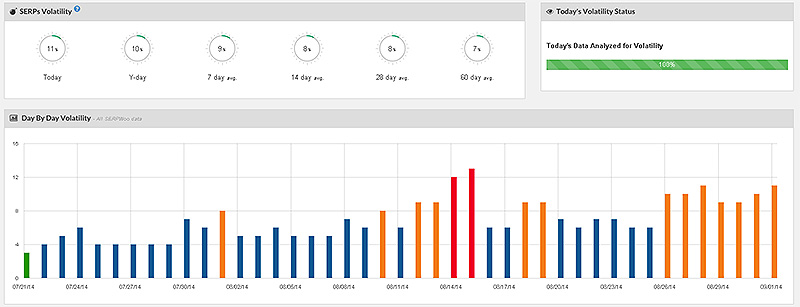Volatility, The New SEO Metric For Monitoring Fluctuations
Near the end of last month, the team here at SERPWoo rolled out a new feature for our customers that we call Volatility.

Volatility Metric
So how does this new feature benefit you exactly?
Starting with this new rollout, you can now take a "snapshot" look at how the SERPs of your keyword has performed:
- Today
- Yesterday
- Last 7 days
- Last 14 days
- Last 28 days
Introducing Volatility
Think of it as the measurement of movement within the top 10 placements for your keywords during the above given timeframes.
Why the top 10?
Looking back at all the data we have collected, positions #11-#20 are always in constant flux with one another no matter the keyword monitored. There are always competitors coming in and out, and moving up and down within these position. If we tried to base how "volatile" the movement in a given SERP is off these placements, the numbers would be all over the place every day.
The top 10 placements for keywords are more stable and predictable in comparision. Generally, the top 3 positions hardly move for a keyword and the other positions interchange at a less rapid pace compared to #11-#20. When there is major change or penalities, it is easier to spot them using just the top 10 placements.
The Old, "One Size Fits All" Way
If people wanted to see movement in the SERPs and try to predict if large displacements of positions were happening (because of a algorithm update or rollout), the only option they had were tools such as Mozcast from Moz, Algoroo, SERPMetrics, and SERPs.com.
These are great tools, but something was missing. The data for most of these tool was generic and not applicable to people who really wanted to dive into their data and find out "is this effecting me?".
Here are the shortcomings we found with other tools on the market currently..
- Mozcast: Only monitors 1,000 select keywords. What are the keywords being monitored? Those keywords don't relate to my niche or vertical.
- Algoroo: I found data that suggests this Australian company is largely basing their data on Google.com.au and a fraction on other markets like Google.com. Not good enough for me.
- SERPs.com: They base their data on 1,000 websites. What are the websites and how/why did they pick them? Is it the top 1000 on Alexa or Compete.com or what?
- SERPMetrics: Seems to be US based only sites. Could not find how they gather their data.
When I need information on what's going on within my niche, the above mentioned services just give me an "OK" experience. None of them really give me an insight into my niche or my keyword.
As a search engine marketer, you want to know what's happening in your niche and maybe your client's niche. Not what's happening within a pre-selected set of keywords and websites that have nothing to do with you.
The New, Accurate & Improved Method
Unhappy with the generic approach that is rampant with our industry, I set out to find solve the question of "is this effecting me?". That's where our new Volatility feature comes into play.
For any and every keyword, we can track the movement of websites within the top 10 over time and report back what exactly is happening to you, relevant to your keyword AND your chosen country.
So say you're tracking "Garcinia Cambogia" for Google Poland.
We can monitor those SERPs for you and report back what the rolling 7/14/28 avaerage day fluctuations are and give you a Volatility Score. When you log in next Tuesday and see that the Volatility for that day and the day before are way higher than the rolling 28 day average, you can instanly know something is wrong and needs to be checked within the SERP.
Google penalities and algorithm updates are not always generically applied to the entire Google landscape. These updates are also not always publicied and updated on their blog. With Volatility, you now have the power to decide what is actually effecting you and what you can do about it even if Google decides to not publicize an update that might have effected your niche.
Usage In Online Reputation Management
As someone in the the ORM space, Volatility gives me an instant insight into the movement of my brand name within the SERP. I can log in daily and determine if fluctuations are moving my positive properties up or down and just how much new information is breaking into the top 10 of my keyword.
If I find that I have a high Volatility Score, I know that a lot of news most be breaking on my brand name. I also know that any sites I am building to push down negative reviews could be finally breaking the top 10 as well.
Usage In Niche Selection
If I wanted to try my hand at a few new niches and verticals, I could load up several keywords and drop them into SERPWoo and monitor them over a 30 day period.
On the 31st day, I could check each keyword and determine if the 28 day average (along with the 7 and 14 day) Volatilty Scores are too high for my taste.
A high score could indicate that many spammers or competitors are trying to take over this space. If I did build a site and my URL did happen to rank within the top 10, it could quickly drop and be replaced by someone else within a few days time.
A low score on the other hand, could indicate a heavly moderate niche where new URLs are not breaking into the top 10 easily.
Interesting enough, CCarter found out that a Volatility Score above 20 was very volatile and that the term "Maple Syrup" in Google CA was more volatile than the heavily spammed and affiliate laden "Garcinia Cambogia" for Google.com

Maple Syrup versus Garcinia Cambogia Volatility
Usage In Determining Google Updates
For most major updates, Google is going to announce the changes on their blog. Moz will run and post it in their Algo Update page and everything will be awesome sauce.
However, for those "updates" that are not confirmed and not named, what are you going to do?
What if manual penalities are handed down in your niche and you get effected? There is no reliable data for these situations.
If you're in doubt and need to check if something is hitting your keyword hard (like the "Payday Loan Update"), you can log into SERPWoo and easily see that the Volatility Score for today and yesterday do not match up with average for the last 7/14/28 days and that lots of URLs are shifting around in your SERP.
Conclusion
Starting today, there is no reason to be left in the dark when it concerns your sites and your niches. No more guessing, no more stress.
No more wondering, "is this only effecting Poland and Canada?". Find out what is happening with your keywords in your country specific Google SERP with Volatility.
The days of letting other companies force feed you generic and unreliable data is over for you and your keywords.
Be on the lookout for our own version of Volatility for the entire Google landscape, where we determine Volatility and changes for all of Google based on ALL the keywords we track.

Global Volatility Stats
To The SERPs!
eLiquid & CCarter
Testimonal From CloudNinja:
Super Beta? More like Super Alpha-as-F@<k. Sky high view of the SERPs is the next step for testing and experimenting. In the past, if I made changes to a website onsite or offsite, it could be hard to determine if all of the results were shifting on a given day or if it was just me who was moving. Welcome SERPWoo... Now, it's easy to see that the 301 I sent to my site on Monday had an affect today, and wasn't random changes like happened on Tuesday. If you haven't started tracking your keyword's SERP yet, you're a week behind everyone else. See you guys on the next level.
